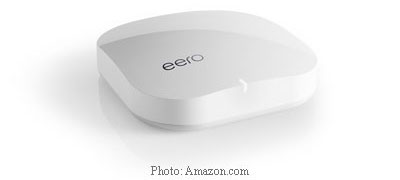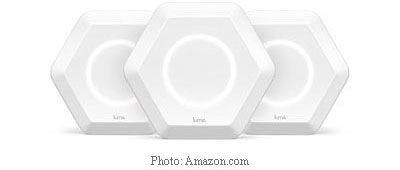If you’re like most people, you probably have several different devices that you need to connect wirelessly. Which is why like most people, you would benefit much from having a power-packed router to ensure that wherever you are in your home, you’ll never feel disconnected.
That said, we have compiled a list of our favorite mesh networking kits. We hope you can use the information to find the best wireless router for your home and help you start your New Year with a bang.
eero Home WiFi (check price)
Thanks to Eero, wireless routers have never looked better. And that’s just the beginning. Eero is easily manageable through its companion eero app (and Amazon’s Alexa if you have one). It offers wide coverage, has customizable parental control features, and is protected with state-of-the-art encryption. With its TrueMesh technology, not only will you get fast, reliable and secure connection, you also get automatic free upgrades intended to continuously improve your connection. This means that as good as your connection already is, it can still get better. And you don’t have to pay any extra.
Google Wifi System (check price)
Google’s router system looks sleek, is easy to set up, and provides wide coverage. One unit covers 500-1500 square feet (small home); two will cover 1500-3000 square feet (medium-sized home); and three will cover 3000-4500 square feet (large home). It’s also built with intelligent software that’s designed to always provide you with the fastest possible speed by avoiding congestion and automatically transferring your connection to the nearest Wi-Fi point for the most optimal signal. Plus, it comes with a parental control feature that will enable you to disconnect your kids’ signal when it’s time for them to do something else like eat, study or sleep.
Luma Home WiFi System (check price)
It’s not just a router but a complete Wi-Fi system. Aside from providing you with fast Wi-Fi connection wherever you are in your home, Luma has built-in security features that empower you to manage your network and protect it from hackers and unauthorized users. It even allows you to keep your kids from over-using the Internet and accessing unsafe or inappropriate sites.
Orbi Home WiFi System (check price)
With Orbi’s 2-Pack System, you get a router and a satellite that work together to provide you with strong Wi-Fi connection that can cover up to 4,000 square feet (for 2 Orbi units). It’s probably the easiest mesh network to set up because you don’t even need an account or an Internet connection to do so. And as the first to make use of Tri-Band Mesh WiFi, it features a dedicated bandwidth that ensures fast and reliable connection comparable with wired ethernet connection. It’s a bit expensive but you’ll get what you pay for, probably even more.
TP-Link OnHub Wireless Wi-Fi Router (check price)
It doesn’t look like a router but it sure functions way better than the average router due to its 13 powerful antennas that can provide coverage up to 2,500 square feet and speeds of up to 1,900 mbps. Through its companion app Google On, you can easily control and set it up using your smartphone. It can connect to more than 100 supported devices, and you have the option to assign priority bandwidth to selected devices. It’s also IFTTT-enabled, which means you can use it to create basic commands to automate simple tasks. And, it conducts regular network checks to ensure connection that’s always the fastest and safest possible.
PORTAL Smart Gigabit Home Wi-Fi System (check price)
The cost of the Portal router is slightly on the higher end, but it’s easy to understand why. One unit can cover as much as 3,000 square feet, which is more than what other routers can typically cover. It’s easy to set up and can be managed from anywhere. It’s secured with a powerful encryption. And it makes use of what is referred to as WiFi Autopilot™ technology, allowing it to use special frequencies that are not accessible to conventional routers, thus ensuring you get fast and reliable connection the whole time you are online.
If you’re still confused on which router to pick, just ask yourself what your priorities are — speed? ease of use? reliability? security? range? cost? — then base your decision from there.










Leave a Reply